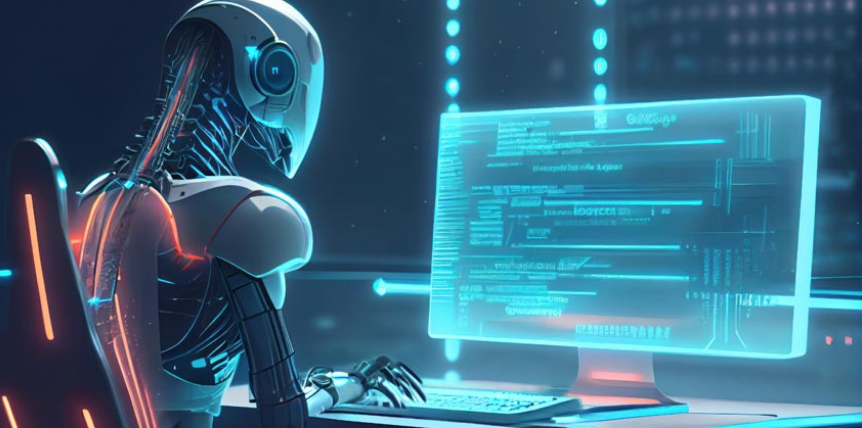Introduction
Is AI a threat to humanity? I think. Yes, there are threats, like potential job displacement and privacy concerns. But if we approach AI development cautiously, thinking about ethics and setting up some solid rules, we can hopefully avoid any major catastrophes.
Table of Contents
Understanding the potential of AI
AI in the 21st century is super important, doing stuff for us and making things personalized. It’s like humans, doing analytics, learning, talking, and robots, changing healthcare and finance.
AI is changing shopping to fit you better and making travel safer. It’s popping up everywhere, so let’s use it wisely!
Debunking Myths & Unveiling Real AI Threats
- Many worry that AI might outsmart us and take over. It’s a common sci-fi theme but creating superintelligent AI is still a puzzle. There’s no proof it would turn against us.
- AI may automate jobs, sparking fears of widespread unemployment. However, history shows tech advancements often create new job opportunities. AI can enhance human abilities for complex tasks
- When it comes to AI ethics, remember: that people are behind the creation and training of AI, using data generated by humans. We ensure transparency and accountability by setting up strong ethical guidelines and reducing potential risks.
Understanding generative AI fears
Existential risk associated with AI
Humans dominate due to their unique brains. If AI surpasses us, control becomes uncertain. Humanity’s fate may mirror the Gorilla’s.
Many debate the risk of AI leading to existential threats, considering factors like AGI development speed and potential takeover scenarios. Influential figures urge caution and global regulation to mitigate these risks.
Dealing with superintelligent AI raises big concerns. It’s hard to control and make sure it shares our values. Some worry it won’t cooperate, while others like Yann LeCun doubt it even cares about its survival.
Super Intelligent AI

Artificial superintelligence (ASI) surpasses human intelligence, exhibiting cognitive prowess and independent thought. Referred to as super AI, it exceeds even exceptional minds like Albert Einstein.
Super AI demonstrates self-awareness and abstract thinking beyond human capacity. It comprehends emotions, forming its own beliefs and desires. ASI spans diverse domains, from math to emotional relations, performing tasks with precision unmatched by humans.
While current AI focuses on narrow tasks, advancements in machine learning and AGI development lay the groundwork for ASI. Despite progress, current technology falls short of replicating human cognitive abilities.
The future of humanity with AI
ChatGPT made waves when it launched in November 2022. Some folks hailed it as a game-changer like space exploration, while others worried it might deepen inequalities and lead to a world ruled by smart machines.
At a recent discussion, experts dug into the impact of generative AI. They stressed the importance of keeping tabs on this tech to avoid major disruptions in work and politics.
Generative AI works differently from regular software. Instead of needing detailed instructions, it can whip up complex stuff with just a simple prompt from us humans.
Beneficial Application of AI
Automation simplifies tasks, making industries more productive and resource-efficient. It ensures better quality and safety across various sectors.
AI-powered solutions like chatbots enhance customer interactions, reducing workload and improving productivity.
By analyzing data and solving complex problems, AI facilitates smarter decision-making, leading to cost reductions and improved efficiency.
Mitigating AI’s Existential Risk
Public fear of superintelligent AI, like ChatGPT, prompts concern akin to Hollywood doomsday scenarios. Recognizing AI extinction risks, experts urge global prioritization akin to pandemics and nuclear war.
Yet fixation on rogue superintelligence may divert attention from urgent risks like mass surveillance, disinformation, and military misuse. Addressing these pressing issues unifies stakeholders and counters long-term existential threats.
AI-induced catastrophes, though often associated with superintelligence, can stem from flawed AI systems. Addressing these immediate challenges garners attention, while discussions on rogue AI draw awareness to safety concerns but risk overemphasis.
Conclusions
AI is everywhere, from healthcare to online shopping, making tasks easier. Expect more industries to use AI for better efficiency in the future.
FAQs: Is AI a threat to humanity?
What is AI’s existential risk?
AI existential risk means the potential dangers that advanced artificial intelligence could pose to humanity’s survival or safety.
Is AI dangerous to us?
Yes, AI can be risky if not handled carefully. It might lead to job loss, reinforce biases, or even cause major problems.
How do we make AI safer?
To make AI safer, we need to follow ethical guidelines, create good laws, encourage diverse AI development, and keep studying how to keep AI safe.
Why do ethics matter in AI?
Ethics matter in AI because they ensure that AI is developed and used in a way that respects human values and keeps society safe and fair.
Can AI help us?
Definitely! AI has the potential to improve healthcare, make work more efficient, and solve big problem — if we use it responsibly.
